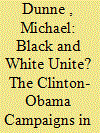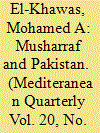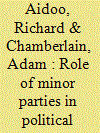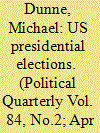|
|
|
Sort Order |
|
|
|
Items / Page
|
|
|
|
|
|
|
| Srl | Item |
| 1 |
ID:
084483


|
|
|
|
|
| Publication |
2008.
|
| Summary/Abstract |
Senators Hillary Clinton and Barack Obama are battling to win the Democratic party's nomination as presidential candidate in 2008. Never has a white woman or a black man been so close to entering the White House. Standing in their way is Republican Senator John McCain, who would be the oldest white male ever to become US president. A possible spoiler for any of the three is the perennial campaigner, Ralph Nader. The political, social and economic histories of women and African Americans have been entwined, often to the cost of the other, since before the American Civil War. Before World War I the issue was the suffrage; then came the struggles for (women's) equal rights and (African American) civil rights, particularly after World War II. These narratives, with the related cross-currents of class and ethnicity, are explored in relation to contemporary history and politics, especially the continuing gender and racial 'gaps' in US society.
|
|
|
|
|
|
|
|
|
|
|
|
|
|
|
|
| 2 |
ID:
087851


|
|
|
|
|
| Publication |
2009.
|
| Summary/Abstract |
Following a 1999 coup, Pakistan's General Pervez Musharraf ruled by decree with the support of the military. He held a presidential referendum and got his party elected. He amended the constitution to legitimize his military rule. His involvement in the war on terrorism led to the rise of religious extremism, and he persuaded the United States to propose a power-sharing plan. In 2007, Musharraf got himself re-elected by the outgoing parliament, an election subsequently challenged in court. In November, he declared a state of emergency and dismissed Supreme Court justices whom he feared would rule against him. Under external pressure, he ended the emergency after he had secured the presidency and resigned from the military. In 2008, opposition parties won the parliamentary elections and formed a coalition government. They have not yet reinstated the dismissed judges. They forced Musharraf to resign, but more steps are needed to complete the transition to a true democracy.
|
|
|
|
|
|
|
|
|
|
|
|
|
|
|
|
| 3 |
ID:
161446


|
|
|
|
|
| Summary/Abstract |
The Kurdistan Region of Iraq (KRI) possesses many of the traditional hallmarks of political authority and society, such as state institutions (an Executive, Legislature, and Judiciary), political parties, civil society, elections, and local government. Nevertheless, for the past twenty-five years, it has failed to create a unified political system that adheres to a mutually accepted form of government. Political division, in particular, a rivalry between the main parties, has proved to be a real impediment to the political development and stability of the Region.
|
|
|
|
|
|
|
|
|
|
|
|
|
|
|
|
| 4 |
ID:
138121


|
|
|
|
|
| Summary/Abstract |
The study of minor parties has largely focused on well-established democracies, even though these political organizations play significant roles in new and emerging democracies. With Ghana as a case study, this investigation provides a theoretical path to understanding the normative role of minor parties in political competition, especially in developing nations with single-member plurality systems. By placing emphasis on the experiences of such parties in Ghana’s 2012 elections in the Fourth Republican dispensation, this article examines the value and importance of minor parties in helping to create and maintain stable democracies. In spite of the recognizable obstacles minor parties face, we argue that they nevertheless contribute to the health of a burgeoning democratic culture.
|
|
|
|
|
|
|
|
|
|
|
|
|
|
|
|
| 5 |
ID:
122488


|
|
|
|
|
| Publication |
2013.
|
| Summary/Abstract |
The system for electing the President of the United States remains essentially as it was prescribed in the Federal Constitution drafted in 1787. The individual 50 states (plus the District of Columbia) are accorded a number of votes in the (so-called) Electoral College; each state's Electoral College vote is then attributed to the candidate gaining a plurality (most) of the popular vote in that state; and the candidate with a majority (50% + 1) of these aggregated Electoral College votes is declared the incoming president. What has changed have been the methods of nominating the candidates, chief of which are the political parties from the nineteenth century with their stage-managed quadrennial conventions and the primary/caucus campaigns from the twentieth century which precede and now determine the formal nomination. President Obama's 2012 re-election campaign showed both the crucial importance of the much-maligned Electoral College in winning the presidency and the demographic divisions hidden in the larger American political landscape.
|
|
|
|
|
|
|
|
|
|
|
|
|
|
|
|
|
|
|
|
|